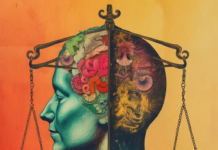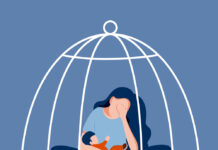A recent study, published in Social Psychiatry and Psychiatric Epidemiology, uses a social identity theory to better understand risk factors for women developing postpartum depression. The results of a survey of mothers who gave birth within the last year, conducted in the US, find that women who maintain their membership in social groups are less likely to develop postpartum depression.
“By specifying more closely the social determinants of postpartum depression, it provides insight not only into the way that changes in social identity can impact women’s postpartum mental health, but also into the means by which practitioners might best deliver a social cure,” write the authors, led by Magen Seymour-Smith, a researcher at the University of Queensland in Australia.

The authors report, “the postpartum period presents the highest risk for women’s mental health throughout the lifespan” with 13% of mothers experiencing postpartum depression. Lack of social support has been shown to be a significant predictor of postpartum depression. Membership in social groups provides a sense of belonging and a source of social support. The authors state, “whatever the basis of a particular group membership, the feeling of ‘us’ that members experience has benefits for mental health.”
The Social Identity Model of Identity Change (SIMIC) suggests that our social identities partly make up our sense of self. Therefore, losing social identities (e.g., no longer being part of a previous social group) threatens well-being. In the case of postpartum depression:
“SIMIC suggests that one reason for this increased risk is that the transition to motherhood often involves women giving up recreational activities (and associated membership of activity groups) and employment (and associated membership of work groups) and thereby losing important aspects of their social sense of self,” write the authors.
According to SIMIC, maintenance of group memberships, or replacing lost memberships with new ones, can mitigate the stress of life transitions. Using this model in the present study, the researchers “aim to investigate the effects of changes in social identity associated with this life transition on women’s postpartum mental health.” The researchers conducted an online survey, “Your Baby, Your Story” and analyzed data from 382 women who gave birth within the past year. The survey included questions on social identity and group membership, as well as depression symptoms using the Depression Anxiety Stress Scales (DASS) and the Edinburgh Postnatal Depression Scale (EPDS).
About 17% of mothers reported having a diagnosis of depression before giving birth. Only 17 women (4.4%) reported a diagnosis of postnatal, or postpartum, depression. “However, 162 women (41.9%) had a score of >13 on the EPDS, indicating significant emotional distress,” report the researchers.
Mothers experienced a small reduction in multiple group memberships after giving birth. Results show that current group memberships and continuity of memberships from before giving birth are negatively correlated with depression (i.e., mothers who maintain group memberships are less likely to become depressed). Contrary to the researchers’ expectations, gaining new memberships after giving birth was unrelated to developing depressive symptoms. The researchers also find, “the more that a mother identifies as a mother the less likely she is to experience depressive symptomology after giving birth.”
Studies consistently show that psychosocial factors are the largest risk factors for developing postpartum depression. However, standard screening instruments, such as the Edinburgh Postnatal Depression Scale, do not assess for psychosocial supports or other contextual factors. Given the US Preventive Services Task Force’s recent recommendations to screen all adults for depression, including pregnant and postpartum women, the lack of social context in the screening process is of great concern.
“This study provides evidence that loss of valued social networks during pregnancy and the postpartum period should be considered to be a significant risk factor in its own right that warrants screening and intervention,” urge the researchers.
Many fear that increases in screening will result in more pregnant and postpartum women being prescribed antidepressant medications. The authors state, “given that the vast majority of mothers refuse pharmacological treatment due to concerns about side effects and breast feeding, a program that targets social (rather than individual) dysfunction may be preferable for many women.” The authors recommend practitioners provide resources on social networks and that treatments address strengthening group memberships. Relatedly, a recent study found that Interpersonal Therapy may help prevent postpartum depression.
It is essential to better understand what factors contribute to the development of postpartum depression in order to provide enhanced supports for new mothers. The authors are the first to provide evidence that SIMIC “offers an important new way of conceptualizing postpartum depression—and one that has profound implications for both researchers and practitioners.”
****
Seymour-Smith, M., Cruwys, T., Haslam, S. A., & Brodribb, W. (2017). Loss of group memberships predicts depression in postpartum mothers. Social Psychiatry and Psychiatric Epidemiology, 52, 201-210. doi:10.1007/s00127-016-1315-3 (Abstract)















Sheesh! Talk about making things more complex than they need to be!
‘The researchers also find, “the more that a mother identifies as a mother the less likely she is to experience depressive symptomology after giving birth.”’
My wife has done research into “Postpartum Depression” (I HATE that term!) in other cultures. She found that there are cultures where there is essentially NO incidence of the “PPD” phenomenon! Not surprisingly, these are cultures where the new mother is supported by a big social network and rituals that welcome them into motherhood. The more the mother can focus on just being a mother and taking care of her baby, with the other women in the group providing cooking, cleaning, childcare, and emotional support, the less likely the women will be depressed. DUH!
Finally, the authors make a somewhat bizarre statement near the end: ‘The authors state, “given that the vast majority of mothers refuse pharmacological treatment due to concerns about side effects and breast feeding, a program that targets social (rather than individual) dysfunction may be preferable for many women.”’
So now, despite what should be the obvious conclusion that social support should ALWAYS be the provided BEFORE “PPD” develops, they are saying that the reason they should provide this “SMIC” (otherwise known as “being a supportive human being”) is because most moms refuse to take antidepressants! As if the two were somehow equivalent????
Again, SHEESH! Way to make the obvious conclusion as obscure as possible!
— Steve
Report comment
Much like mental health “care” labor and delivery in a typical American hospital is associated with profoundly traumatic assaults on the dignity of its victims. They are stripped of their clothes, subject to unwanted poking and prodding by people pushing drugs in sometimes physically violent ways. Meanwhile the vulnerable laboring mother pays enormous sums for an experience some refer to and experience as “birth rape”. Going into a hospital, young, naive and trusting the authorities of that institution to look out for your best interest is a great awakening for many women that are left with postpartum traumatic stress.
Rather than ask what are we doing to women in labor and delivery that they leave traumatized the victims of trauma are blamed of some inherent female weakness another made up, money making diagnoses called PPD . In fact, far more often then some fault of the mother, the experience of care has deeply wounded her. The victim of inhumane treatment is not comforted but rather accused of having postpartum depression. In fact like psychiatric patients that leave an institution demoralized, traumatized and tortured, many women have a similar experience with birth practices.
In a previous profession I dealt with thousands of postpartum women and noted anecdotally their loss of autonomy once they entered the hospital doors played a big part in how traumatized they were. Its something women don’t talk about, they are admonished they had a healthy baby, get over it, its just the way it is, that’s birth after all. But, in their souls they know it wasn’t meant to be that way and thus a cognitive dissonance between what they instinctively know is right versus what happened strips their sense of safety in the world
When psych patients refuse treatment because its been traumatic rather than ask “what is wrong with our treatment” the patient is considered to have a broken brain and unable to tell what is actually good for them. This is the bait and switch of industrialized medicine. It applies to childbirth as well. Those countries with lower rates of so called PPD don’t have the same c-section and intervention and drugging rates that American hospitals are infamous for.
Report comment
I totally agree with your observations, Katie W. My experience with hospital birth left me feeling like I’d been sexually assaulted. It was horrible. And I was supposed to feel grateful for the violent and humiliating treatment I received! My home birth experiences were a much healthier, safer, and more humane.
Report comment
All very true. My wife has been a doula and I used to live with a homebirth midwife, plus I worked at a teen moms’ home, so I’ve seen plenty of “standard of care” obstetrics, and its brutality and disrespect and complete disconnection with both science and common sense is exceeded by only one other discipline – psychiatry! The parallels between psychiatry and obstetric care in America are legion. Both need to be started over from scratch!
— Steve
Report comment